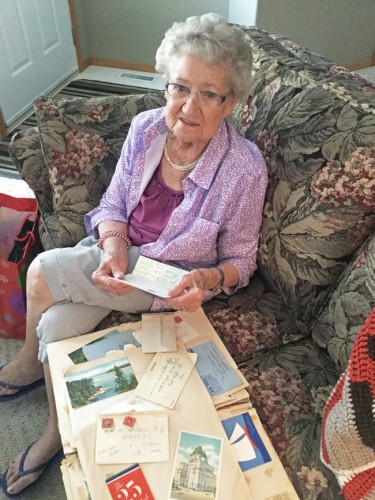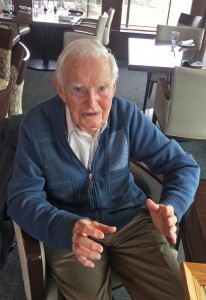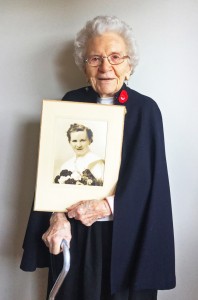During November, the month of Remembrance, we read and watch many interviews with veterans. Sadly, our Canadian veterans are vanishing at the rate of about fifty each day.
Author Elinor Florence has interviewed hundreds of seniors in her career as a journalist, and also in her current occupation as a writer of the blog Wartime Wednesdays. I asked Elinor to share tips on interviewing an elderly person in order to preserve their precious memories, in whatever form, for future generations. This advice is invaluable for those setting out to write a memoir or to assist an older person — perhaps a loved one — write theirs.
I’ll give you my very best piece of advice up front: DO IT NOW. A stroke, a fall, a sudden illness can end any possibility of recording your loved one’s memories.
Whenever I do a book signing, I am approached by people who say regretfully: “If only I had asked my father (or mother, or grandparent) more questions. Now it’s too late.” So without further delay, set aside a couple of afternoons or a weekend and visit your loved one and interview them using the following tips:
Be enthusiastic. Many people have spent years thinking nobody was interested, and it might take some encouragement to convince them that you really ARE fascinated by their stories. People often tell me: “My grandfather never spoke about the war.” Maybe it’s because nobody asked him.
Visit the subject at home. An elderly person will be more comfortable in her own surroundings. A quiet room with good lighting and no interruptions is best for optimal vision and hearing.
If possible, plan two or more visits. Memories rise to the surface slowly. After the initial visit, he will be thinking about the old days, possibly lying awake during the night as the memories come flooding back. It is on the second or third visit that you might unearth the most interesting material. I interviewed an elderly man who phoned me several times over the next few weeks, because he was still remembering things he wanted to tell me.
If you record the interview, do it unobtrusively. My iPhone makes a perfect tape recorder. Any cell phone will do. First ask the person’s permission. Turn it on, ensure it is working, set it on the table between you, and forget about it. If you don’t look at it or touch it again, she will forget about it too. (If you need more information about audiotaping or videotaping your loved one, here’s a link to a Library of Congress website with information about preparing for and conducting an interview. http://www.loc.gov/vets/prepareforinterview.html)
Don’t be impatient. Some (but certainly not all) elderly people speak slowly. Don’t interrupt or ask another question. It’s best if you sit quietly and make gestures or sounds of encouragement while your subject dredges up the memories. Adapt yourself to his pace of thinking and speaking.
Provide plenty of encouragement. Elderly people, especially women, are so modest that they have to be drawn out of their shell. Remind her that she is contributing to history, and that her grandchildren will thank her someday.
Be observant. Look around the room. Often people have their most important mementos on display. Ask about what you see: a framed certificates or old photographs, for example.
Ask about props. When you set up the interview, find out if the subject has photo albums or scrapbooks. Often these are put away somewhere, and it might take a few days to unearth them. Sit down beside him and page through the album together — this is a great way to spark his memories. Once again, I use my trusty cell phone to photograph any desired clippings or photographs in the collection.
Allow time for a break. After a couple of hours, your interviewee may begin to flag. At that point, you could suggest a cup of tea before returning to the conversation. Three hours is an average time to chat. However, my experience has been that most people are invigorated by the unusual experience of talking about themselves, and their energy may surprise you. The fatigue will come later, after you have left.
Ask if the subject would like a family member present. There are pros and cons to conducting interviews with other family members in the room. The drawback is that the elderly person may not be as forthcoming with others there as she would if she were alone with you. You want to take her back to the heady days of her youth, and that’s more difficult when her granddaughter is sitting there. On the other hand, family members can help to remind the person of buried memories, search for old letters or photographs, or make the aforementioned tea.
Call around to find someone who will record your loved one for free. Some local museums — for example, the Military Museums of Calgary — will send out an expert to interview your loved one and preserve her memories for their own collection. You will benefit from access to the recorded interview as well.
Finally, consider hiring a professional. I have been asked many times to interview someone’s father, mother, or grandparent. I can’t accommodate all these requests, but I know people who do interviews for a living — whether in print, audio, or video. Here’s a link to just one of them, Rebecca Robinson of Kelowna, whose business is called Life Story Film: http://www.lifestoryfilm.ca. A printed interview will cost several hundred dollars, while a professional video with background music, still photographs, and film clips will cost several thousand. But if your family members pass the hat to have a video made, it might be well worth the expense. What a fantastic gift for the whole family — not only those who are living but also the children and grandchildren to come.
I always conclude my interviews feeling blessed and privileged to have shared in someone else’s fascinating life. I’m sure you will too.
To read Elinor’s blog post featuring interviews with ten living veterans, visit: www.elinorflorence.com/blog/wartime-legends.
To order her wartime novel Bird’s Eye View, about a Saskatchewan farm girl who joins the air force, goes overseas, and becomes an interpreter of aerial photographs, click here: www.elinorflorence.com/birdseyeview.




Great tips, Elinor. Thank you.